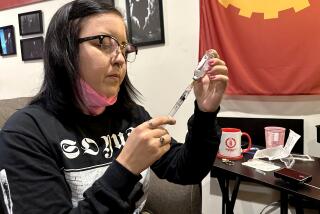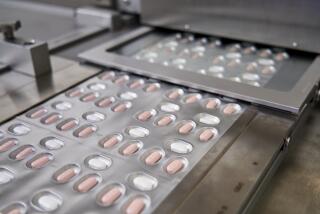Prescriptions Waived for Home Defibrillators
- Share via
WASHINGTON — The Food and Drug Administration decided Thursday that consumers can buy devices to jump-start failing hearts at home without a prescription. About 80% of sudden cardiac arrests occur at home.
Before the agency’s decision, consumers who wanted a HeartStart home defibrillator to use in those crucial minutes before an ambulance arrived needed a doctor’s prescription.
The FDA endorsed a July recommendation from its advisory panel to remove the prescription requirement after federal advisors were satisfied that consumers could use the machines safely.
Unlike a heart attack, sudden cardiac arrest is an electrical malfunction of the heart that triggers an abnormal rhythm that can be fatal. Often, it’s the first indicator of heart disease and accounts for roughly 340,000 deaths outside of healthcare settings each year.
A shock from a defibrillator is the most effective way to end a sudden cardiac arrest, which leaves the victim breathing abnormally and unresponsive.
HeartStart delivers a jolt equivalent to that required to illuminate a 150-watt lightbulb for one second.
When the shock is administered within five minutes of cardiac arrest, 50% of victims survive, said Deborah DiSanzo, vice president and general manager of cardiac resuscitation at Philips Medical Systems, the device’s manufacturer.
Ambulances typically arrive within nine minutes of a 911 call. Ten minutes after the sudden cardiac arrest, the patient has a 1% chance of survival, she said.
The company said it had sold more than 6,000 devices since November 2002, when the FDA first approved its use.
Waiving prescriptions could raise sales beyond 20,000 per year, a volume high enough to cut a few hundred dollars from the $1,995 price tag, DiSanzo said.
Dr. Graham Nichol, chairman of the American Heart Assn.’s automated external defibrillator task force, surveyed scientific journals published since 1966.
“There are no reports to suggest these devices are unsafe. Furthermore, there is no evidence the prescription requirement increases safety,” Nichol said.
“It’s essentially a medical device that is safe for consumers to use.”
Still, because of the lack of “sufficient scientific data,” the association said it would not endorse or caution against the use of the devices in homes.
“Will lives be saved? Lives have already been saved,” Nichol said. But he added that it was not clear how many had been “or how many will be in the future.”
Dr. Arthur Kellermann, chairman of the department of emergency medicine at the Emory School of Medicine in Atlanta, said he had “substantial reservations” about the FDA’s actions.
Kellermann called the devices “very expensive lottery tickets” because there was “a remote possibility” that any family might save a life by owning one.






